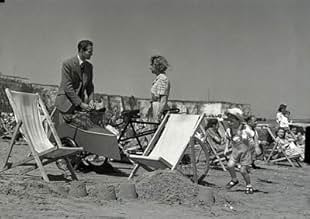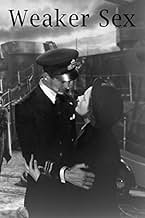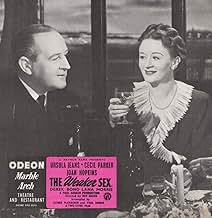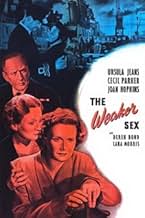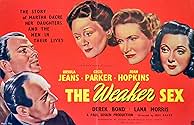Aggiungi una trama nella tua linguaA mother struggles to maintain normalcy at home as D-Day nears. With lodgers, absent children in the Navy, and no war job, she questions her choice to remain a housewife when her son's ship ... Leggi tuttoA mother struggles to maintain normalcy at home as D-Day nears. With lodgers, absent children in the Navy, and no war job, she questions her choice to remain a housewife when her son's ship is damaged.A mother struggles to maintain normalcy at home as D-Day nears. With lodgers, absent children in the Navy, and no war job, she questions her choice to remain a housewife when her son's ship is damaged.
- Regia
- Sceneggiatura
- Star
- Premi
- 2 vittorie totali
Basil Appleby
- Seaman Taylor
- (non citato nei titoli originali)
Clement Attlee
- Self
- (filmato d'archivio)
- (non citato nei titoli originali)
Dorothy Bramhall
- Mrs. Maling
- (non citato nei titoli originali)
Winston Churchill
- Self
- (filmato d'archivio)
- (non citato nei titoli originali)
Helen Goss
- Woman in Silk Stockings Queue
- (non citato nei titoli originali)
Recensioni in evidenza
Cheap-looking, studio-bound and obviously based on a play, but it looks good and is to be cherished as a very rare film lead for the charming Ursula Jeans.
This is what the war years British film industry excelled at. Ursula Jeans and Cecil Parker are a widow and friend of the late husband and her assorted adult children and relatives. The action of the film starts with Mrs. Dacre (Jeans) being given a fresh hen by a random soldier-which might be stolen. Parker is seen vacuuming the floor. War has switched their roles. Their growing friendship is nice to watch. Mrs. Dacre's sister is directly involved in the war so has the luxury of a free uniform, and they frequently clash. A son and daughter are in uniform too. The small issues set the restrained tone, not unlike Mrs. Miniver and Since You Went Away. But inevitably the war and DDay inflict a series of tragic events onto the people connected to Mrs. Dacre.
Now that the last of this generation is down to a few, films such as these will become more important as a cultural record.
If you have any interest in home front history, you'll enjoy this. I found it remarkably moving. The action sequences are terrific and the sets help to remind us how we live in relative luxury compared to life during wartime.
Definitely recommend.
Now that the last of this generation is down to a few, films such as these will become more important as a cultural record.
If you have any interest in home front history, you'll enjoy this. I found it remarkably moving. The action sequences are terrific and the sets help to remind us how we live in relative luxury compared to life during wartime.
Definitely recommend.
This movie could easily have been an unmitigated disaster -- no plot to speak of, not much in the way of memorable dialog, the uneasy feeling a viewer has nowadays that it's all a great big stiff-upper-lip and tally-ho-for-rationing exercise. What saves it is the transcendent acting -- lines spoken so perfectly, body movements so in sync with the spirit of the situations -- and a sure sense of editing that keeps the story (slim pickins as it is) moving. So what have we here, after all's said and done? I think we've been given a good postcard for future generations, a card which says, "Yes, this is how it was; this is how we got through it all. We behaved well toward one another, and we all came out of it all right." I often stop movies to take breaks if they seem a little long-ish. This one played right through to the end, and I was sorry to see it finish. I could have spent much more time with these lovely people.
A rather inconsequential drama that offers a post-war pat on the back to all the housewives that kept the home fires burning while their menfolk and daughters were off fighting Nazis. Ursula Jeans is the anchor of both the film and the family that faces the typical highs and lows of domestic wartime life. It's watchable enough, but feels awfully rushed and episodic the longer it goes on, and is probably the only film in which Cecil Parker plays the romantic lead...
This is rather a strange film with an even stranger title.The film has a substantial amount of newsreel film intercut with the drama.Also there are newspaper headlines shown often when they seem to be of little dramatic point.Cecil Parker and Thora Bird steal the acting honours.I do wonder what contemporary audiences would have made of this film.Particularly being reminded of the austerity that everyone was having to suffer.Films like this were far better made during the war.
Lo sapevi?
- QuizMartha Dacre quotes from "Life a duty" by Ellen Sturgis Hooper (February 17, 1812 - November 3, 1848): "I slept, and dreamed that life was Beauty; / I woke, and found that life was Duty."
- Curiosità sui creditiOpening credits prologue: The story of Martha Dacre and her family covered the period of four years from D-Day onwards . . .
It might have been your story.
- ConnessioniReferenced in The Good Life: The Weaker Sex? (1975)
- Colonne sonoreThese Foolish Things (Remind Me of You)
(uncredited)
Written (1936) by Eric Maschwitz and Jack Strachey
Sung by Cecil Parker in opening scene
I più visti
Accedi per valutare e creare un elenco di titoli salvati per ottenere consigli personalizzati
Dettagli
- Tempo di esecuzione
- 1h 24min(84 min)
- Colore
- Proporzioni
- 1.37 : 1
Contribuisci a questa pagina
Suggerisci una modifica o aggiungi i contenuti mancanti

